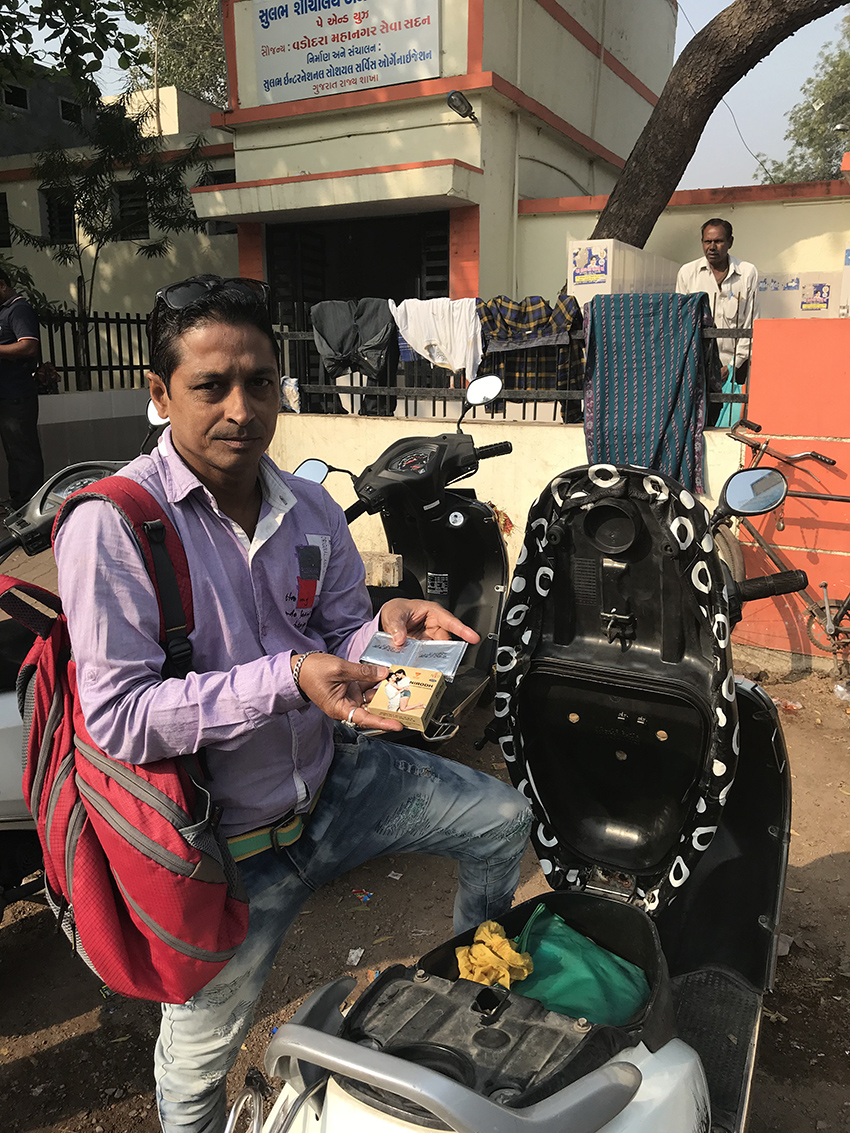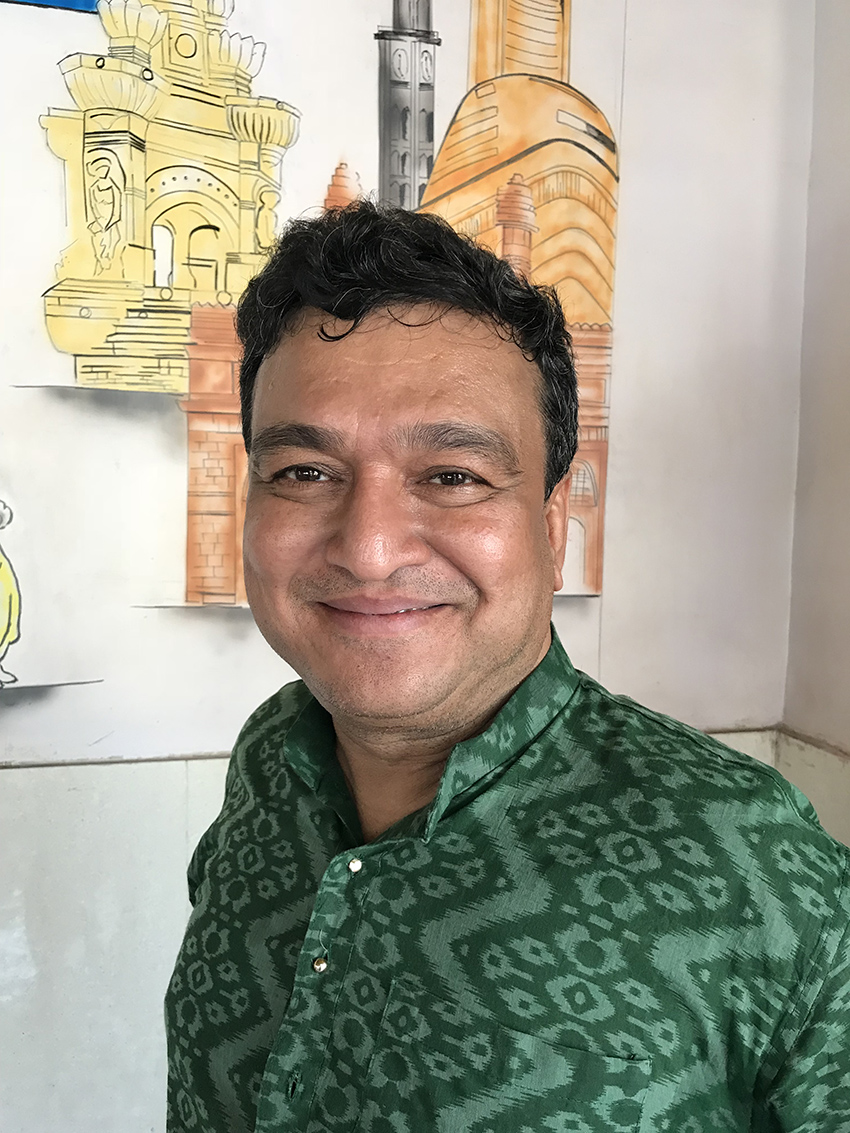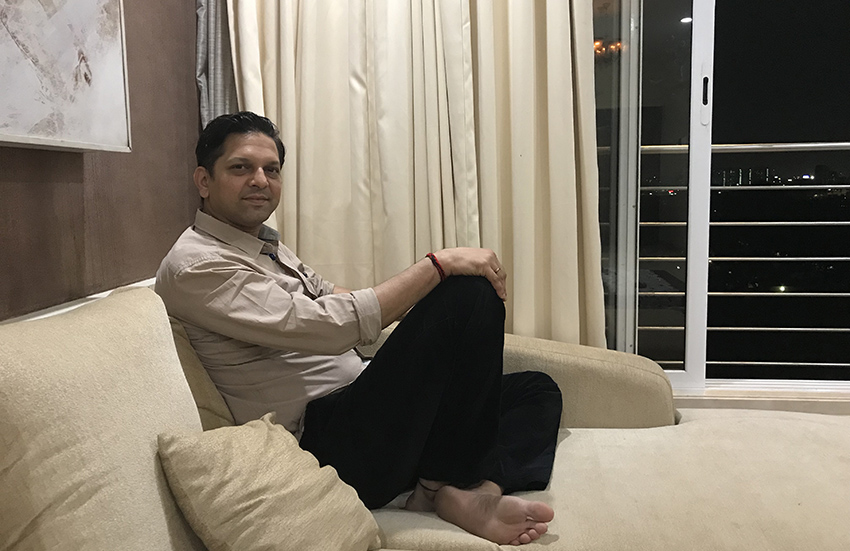India – a country with 1.3 billion people. And, I suspect, for its LGBTI inhabitants, a country with a billion secrets.
I have spent the last few weeks travelling around Rajasthan, Utter Pradesh and Gujarat. I’ve still seen only a tiny fraction of India. But I’ve learnt a huge amount from the LGBTI people I’ve met here.
For much of the LGBTI community, secrets and lies and double lives are a way of life. I spoke to dozens of gay men on my trip and almost half were married. To women. And had children.
His wife and kids have no idea he’s sleeping with men
‘My mum told me if I didn’t marry a woman she would kill herself,’ Aadab (name changed) told me.
He’s a 30 year old gay man in Gujarat. He proudly showed me pictures of his wife and two children. But none of them know he has multiple male partners too.
He’s a good Muslim and goes to the mosque every Friday to pray. And he has no intention of coming out as gay or bisexual.
It’s a story I heard over and over again. I was shown countless photos on mobile phones of weddings, holidays, children’s birthdays and family life. Meanwhile, the secret gay side of their life was not as well documented.
How the anti-gay section 377 law really works
India still has the British colonial law which made gay sex illegal on its books. It’s section 377 of the Indian penal code. In fact, Delhi High Court judges struck it down in 2009. But then in 2013, Supreme Court judges brought the law back.
The reality of gay life under 377 is that few people are arrested or imprisoned. That’s not what keeps gay and bi Indians awake at night. What they really fear is being caught, of their family finding out, of ‘disgrace’.
Thanks to the British, homosexuality has been criminalised for the majority of the time since the colonial era. As a result, whatever their religion, generations of LGBTI Indians have grown up in a society that mistrusts them and expects them to get married to the opposite sex.
Gangs target richer gay men and the police even help
Aabad may have been the victim of emotional blackmail from his own mother. But that’s just the start of it. For many Indians, there is also the very real prospect of actual blackmail and extortion.
Pallav Patankar struggled with his sexuality but is now out, proud and accepted by his family.
‘A lot of extortions happen because of 377,’ Pallav Patankar told me.
‘There are gangs who actually identify gay men who have money and will target those individuals. Some are even being targeted by gangs who are in cahoots with the police.
‘Now because of phones and the availability of videos, there’s more evidence so it’s become worse. It only gets more scary.’
He says the Hamsafa Trust, an LGBTI organisation, helps a lot of men who face extortion. He says this effects a lot more men than arrest or imprisonment.
‘Give it back to the bullies, don’t come back crying to me’
Pallav Patankar is an LGBTI rights activist based in Mumbai. When he was a teenager he was helped by the Hamsafa Trust. So he went on to work for them to pay them back, eventually running the charity for a time.
‘Had they not been there for me I would have been lost. They gave me a support system and a framework.’ he told me.
‘At the age of 16 I started feeling extremely worthless and suicidal. It started affecting my grades. I was an effeminate child. It is who I am. I was ashamed of it and I got bullied.
‘But I was also raised by a tough mother. So she said: “Give it back to the bullies. Don’t come back crying to me, or you’ll be crying for the rest of your life!”’
Now in his 40’s Pallav is more than comfortable with his sexuality. Luckily, so is his family.
I visited him in his north Mumbai apartment which he shares with his mother. And I hardly needed to ask if she was OK with him being gay. She knew I was there to interview him about gay rights and she greeted me like an old family friend. She even insisted I shared rice and dahl with her.
‘Why do you want to take this moral high ground of not marrying a woman?’
Pallav is one of the increasing numbers of gay men who have resisted pressure and haven’t married a woman. He says his mother has made peace with it now but she did struggle:
‘She once asked me: “Gay men do get married. Why do you want to take this moral high ground of not marrying a woman?”
‘So I asked her: “As a woman would you have married a gay man? And would you be ok with your daughter marrying a gay man?” And she said, “no that would not be right!”
‘She reflected and said “yes I’m asking you to do something dishonest – and that wouldn’t be the right thing to do. I’ll never have this conversation with you again.”’
As well as campaigning for LGBTI rights, Pallav is a feminist. He’s passionate about educating gay men on why they should resist getting married because of the detrimental effect it’s having on the women of India.
He’s also passionate about campaigning for the end to section 377. He says the law affects people in more ways than you might realise.
‘Everything is affected by section 377. It also affects property and the inheritance of gay men. For example, if you rent to two gay men and you know they’re gay, you’re effectively breaking the law!
‘People think it’s all about sex. But it affects the way people live. It affects their quality of life.’
My family show girls to me and I make an excuse

Rajesh still makes excuses to avoid marriage.
Another gay man who’s managed to hold off marriage is Rajesh.
He’s 38 and works for an HIV and LGBT charity called The Lakshya Trust in Vadodara. It’s the charity founded by Prince Manvendra – India’s only out gay prince. Despite his very out work life, Rajesh still feels unable to come out to his family.
‘I was 17 or 18 when I realised I was interested in boys. But I was scared to have sex with them though. I was so scared I didn’t come out.
‘I was very disturbed because my father was very strict and I thought he’d beat me and make me leave the house.’
Despite the fact his father passed away 10 years ago, Rajesh still hasn’t told his mom or anyone else in the family.
I asked how he avoids the inevitable subject of marriage.
‘I think everyone probably knows I’m gay, because by 22 most people are married. My family have always shown girls to me but I’ve always had an excuse – studies, work, whatever!
‘I’ve come up with loads of excuses over the years. My mother is very understanding.’
‘He appears to love you a lot and he’s going to look after you’
There are others though who have managed to come out to their family and are leading fulfilled lives as out gay men. Dibeyendu Ganguly (Dibs to his friends) has been with his boyfriend for 26 years now. He lives in Mumbai and is one of the original members of Gay Bombay, a social group who organise parties and meet ups for the LGBT community.
He met me in central Mumbai during his lunch break from his job as a journalist for The Financial Times. And during our chat, he told me how supportive his mother is.
‘My family met my boyfriend and they understood. I didn’t need to come out. My mum when she met him said “I’m really happy for you. He appears to love you a lot and he’s going to look after you. I don’t have to worry about you anymore!”’
Sadly, his father died before he could find out.

Dibeyendu Ganguly, or Dibs to his friends.
‘His father was red with outrage’
So Dibs has resisted pressure but that’s not the case for many of his friends. He accepts that as an educated, financially solvent individual it may have been easier for him.
‘Sure it’s harder if you live at home and are not financially independent. You have to do what your parents say.
‘Pressure to get married starts by the age of 21. I have lots of friends who have been pressured into getting married. I’ve even attended their weddings. I had a friend who was so angry with his father that he invited all his gay friends to his wedding. His father was red with outrage!’
Police equate lesbians with sex workers
Despite my attempts, I failed to meet any lesbians in India.
As Pallav put it: ‘Lesbians are there but they can be quite invisible. There’s the double whammy about being women too.
‘Indian men don’t understand lesbians. Even the police don’t understand it, they equate lesbians with being a sex worker.’
He told me of a terrible case fairly recently in Mumbai which the Hamsafa Trust were involved in.
‘We once got a distress call from two lesbians who were under house arrest. Their families had found out they were having a relationship. So they stopped their education and forbade them from leaving the house.
‘In the end we had to get the police to summon them to the station. We helped them leave their families.’
Gay India is coming out of the closet
Despite 377 and despite the inherent homophobia in society out gay life carries on. And it is particularly visible in the cities.
In early February people took to the streets of Mumbai for an LGBTI Pride march. And there are also busy gay scenes in Delhi and Calcutta.
‘The whole gay scene has expanded a lot.’ says Dibs. ‘Gay Bombay organise events, as do other groups. We host six parties a month and get between 300 and 400 people at each! The police just don’t get involved.’
The law can’t stop people marching or meeting. Technically, it can only stop people having gay sex – and of course it fails to do even that. Moreover, there is a sense of optimism in the air that 377’s days are numbered.
‘People will feel free’
The Supreme Court has officially said it will review the law. And a court decision on the subject of privacy last year, indicated judges are open to striking down 377. That legal process in the Supreme Court is now expected to start in April.
With India’s 1.3 billion population, the end of 377 will represent the biggest single liberation in the whole history of global LGBTI rights.
And if India’s LGBTI community is lucky, it’s only a matter of time.
‘I think things will change.’ Pallav told me. ‘This country is all about progress. And they will soon realise the LGBT community is a huge part of their workforce.
‘In the end, they won’t want a policy that will affect growth. There are some politicians who are ready to hear us – we all just need to raise the volume.’
And Dibs agreed.
‘Truth be told it’s a rarely used law. I don’t know anyone who’s been arrested,’ he told me ‘But I’m really confident the law will be overturned. The whole world is bringing pressure on India.
‘There will still be people in the closet, but if 377 is repealed it will mean a lot. People will feel free.’
Help and support for gay India
Humsafar Trust, the oldest LGBTI organisation in India.
Lakshya Trust, helping and advocating for LGBTI in the west Indian state of Gujarat.
Gay Bombay, organising events in Mumbai.
Also by Emma Goswell:
India fights HIV with Valentine’s Day march at gay cruising spot







